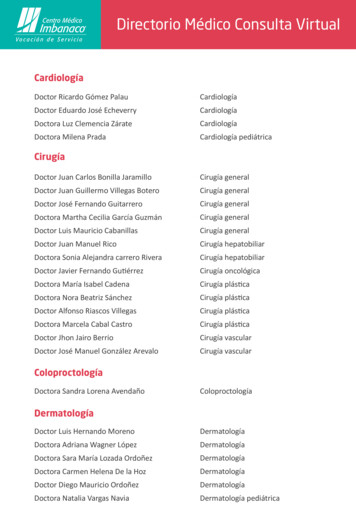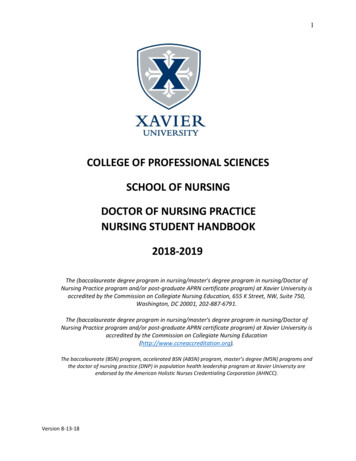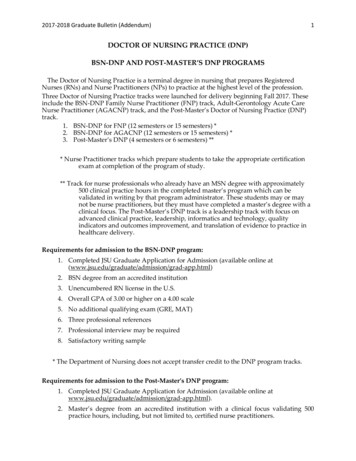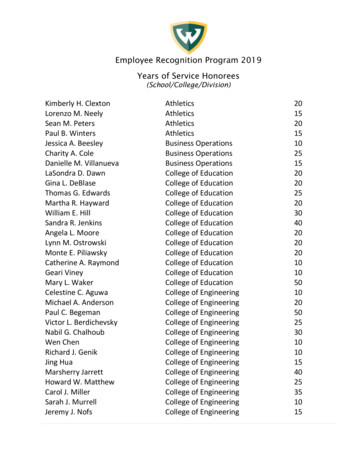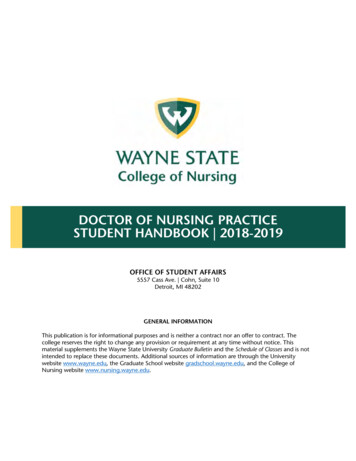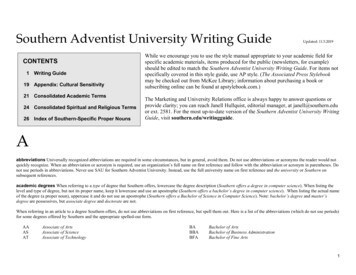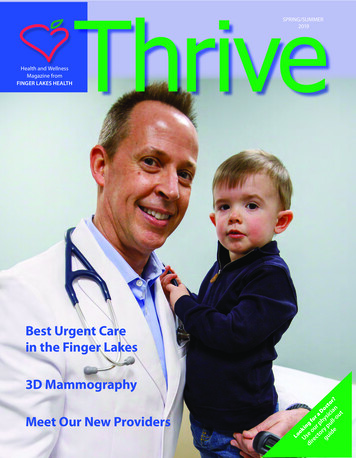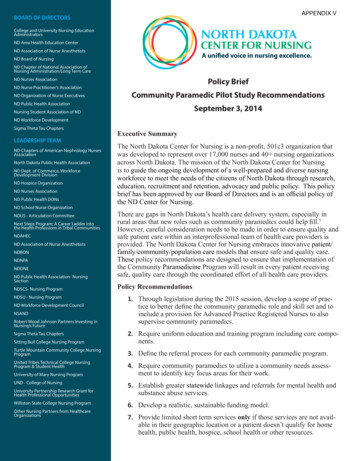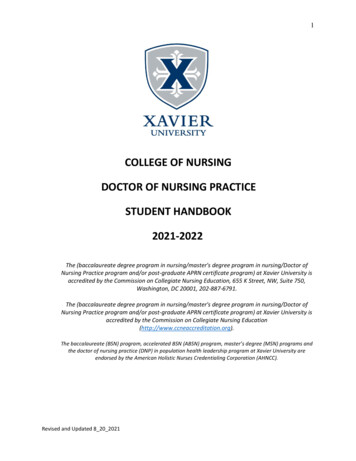
Transcription
1COLLEGE OF NURSINGDOCTOR OF NURSING PRACTICESTUDENT HANDBOOK2021-2022The (baccalaureate degree program in nursing/master's degree program in nursing/Doctor ofNursing Practice program and/or post-graduate APRN certificate program) at Xavier University isaccredited by the Commission on Collegiate Nursing Education, 655 K Street, NW, Suite 750,Washington, DC 20001, 202-887-6791.The (baccalaureate degree program in nursing/master's degree program in nursing/Doctor ofNursing Practice program and/or post-graduate APRN certificate program) at Xavier University isaccredited by the Commission on Collegiate Nursing Education(http://www.ccneaccreditation.org).The baccalaureate (BSN) program, accelerated BSN (ABSN) program, master’s degree (MSN) programs andthe doctor of nursing practice (DNP) in population health leadership program at Xavier University areendorsed by the American Holistic Nurses Credentialing Corporation (AHNCC).Revised and Updated 8 20 2021
2Xavier University College of NursingDoctor of Nursing Practice in Population Health LeadershipStudent HandbookThe Xavier University Doctor of Nursing Practice (DNP) program is an online population healthpost-graduate degree program that prepares nurses as leaders in local, regional, national, orglobal health settings to address the complexity of health care and health care outcomes in the21st century. Through the lens of Jesuit tradition and values, students will build on a previouslyearned master’s degree to achieve the highest level of academic preparation in nursing.The curriculum integrates scientific, philosophical, ethical, and historical perspectives of nursingpractice with a global and holistic perspective of health care delivery. Organizational andsystems leadership, interprofessional collaboration, population–based innovation, evaluation,health policy and advocacy are examined for the improvement of health outcomes in diversepopulations. Intense immersion experiences throughout the curriculum focus on theintegration of knowledge gained. A final DNP scholarly project incorporates the design,implementation, and evaluation of delivery methods to improve the health of the nation.Immersion hours are required as DNP students progress through the program. A total of 1000hours is needed for graduation, a portion of which may be fulfilled by prior graduate academicexperience or advanced certification. Given the program’s concentration on health care in avariety of settings, students choose populations and immersion settings of interest to them.Program PhilosophyJesuit tradition and values, population health, holism, ethics, and interprofessionalcollaboration provide the philosophical basis and guiding principles for this DNP program.Health care reform, the Future of Nursing Report 2020-2030: Charting a Path to Achieve HealthEquity, Quality and Safety Education for Nurses (QSEN), AACN Faculty Think Tank Report &Recommendations 2017, the AACN Doctoral of Nursing Practice (DNP) Essentials, 2006, and theAACN Essentials for Advanced-Level Nursing, 2021 further guide the DNP curriculum.Revised and Updated 8 20 2021
3Program Goals1. Integrate the scientific, philosophical, ethical, and historical underpinnings of professionalnursing practice from a global and holistic perspective.2. Provide organizational and systems leadership for quality improvement and systemsthinking.3. Provide leadership in clinical scholarship and analytical methods for the translation ofresearch in evidence-based care.4. Utilize information systems/technology and patient care technology for the holisticimprovement and transformation of health care.5. Influence health care policy by possessing essential skills in policy and advocacy.6. Establish interprofessional collaboration for holistically improving patient and populationhealth outcomes.7. Design, implement, and evaluate health care delivery methods for illness prevention andpopulation health for improving the nation’s health.8. Utilize conceptual and analytical skills to distinguish relationships among practice,organizations, diverse populations, fiscal resources, and policy concerns and to advancenursing practice.Revised and Updated 8 20 2021
4DNP Program Eight Semester Curriculum SequencePrerequisite: NURS 864 Epidemiology (3)FallYear 1SpringSummerNURS 900DNP Foundations (3)NURS 903Nursing Leadership inComplex Population-BasedHealthcare Systems (4)*NURS 906Informatics for AdvancedNursing Practice in ComplexHealth Systems (3)NURS 904Application of AdvancedResearch Methodologies (3)NURS 902Advanced Evidence BasedPractice (3)NURS 912DNP Writing Seminar (1)Year 2FallNURS 905Healthcare Finance andEconomics for Nurse Leaders(4)*SpringSummerNURS 910NURS 911Scholarship of AdvancedImmersion and DNPApplication and Innovation (3) Project I (3)**NURS 908Health Care Policy (3)NURS 907Evaluation and Analysis ofOutcomes in Health Care (4)*Year 3FallNURS 915Immersion and DNPProject II (3) **SpringNURS 917Immersion and DNPProject III (3) *** includes 1 credit for immersion hours 45 contact hours** Immersion courses to complete the DNP project and hours required for program completionRevised and Updated 8 20 2021
5Academic AdvisingThe DNP Associate Director will serve as the academic advisor for course progression for eachstudent.DNP Faculty Mentor and Project TeamThe DNP faculty mentor is a doctorate prepared member of the faculty of the XU College ofNursing (XU CN). Students will have the opportunity to meet the graduate program faculty asthey move through the DNP program. Completion of the DNP project prospectus is anassignment in the NURS 903 Nursing Leadership in Complex Population-Based HealthcareSystems course. The abstract of this paper will be shared with the faculty, and mentors will bematched with consideration of the student’s intended project. Students will be notified of theirfaculty mentor.The DNP project team consists of the student, a doctorate prepared faculty mentor, and at leastone other member with the skills and expertise needed to ensure success of the project. Thenature of the student’s proposed work will determine the specific talents required for theproject team, and the student will work with their faculty mentor to identify team members.Clinical experts from the DNP project site may be included as team members. The DNPAssociate Director will provide oversight of all DNP scholarly projects and team members. Themaximum number of team members whose primary affiliation is outside the university islimited to two. Only doctorate prepared team members can vote to approve the DNP proposaland final DNP project. The roles and responsibilities of the DNP student and the project teamfaculty and members are outlined in Appendix A.DNP Scholarly ProjectThe final DNP scholarly project demonstrates mastery of the knowledge, competencies, andskills to meet the AACN essentials, and is required for program completion. The student willwork under the guidance of his or her mentor to select a population health relatedphenomenon of interest, problem or issue in which improvements are needed for the DNPproject. The timeline and milestones for completion of the DNP program, including thescholarly project, are included in Appendix B.DNP CandidacyPrior to participating in NURS 915 Immersion and DNP Project II course, the DNP student mustachieve candidacy. The student will write a scholarly DNP project proposal under the guidanceof their faculty mentor during the NURS 911 Immersion and DNP Project I course. Followingsatisfactory defense and approval of the DNP project proposal and presentation, DNPRevised and Updated 8 20 2021
6candidacy is achieved after satisfactory revisions to the proposal document are completed andsubmitted.Immersion ExperiencesImmersion experiences provide the student with opportunities to engage in a practiceenvironment to witness, understand, apply and reflect on specific aspects of the AACNessentials. In partnership with the course faculty, students select and are precepted by nursingor interprofessional leaders during their immersions. Goals are established for the immersionexperience by the student and shared with the preceptor. The preceptor and student identifythe activities, events and people that will assist in meeting these goals during the immersion.Students are required to have 1000 immersion hours to complete the DNP program. Themaximum number of hours that can be earned and credited outside of the DNP program is 500hours.Credited Hours Outside of the DNP Program Credited hours (up to 500 hours) for Master’s level practicum/immersion hours. TheDNP Associate Director will determine the number of hours credited based on areview of the student’s transcript and hours submitted by the student. Each studentwill receive written confirmation of their number of credited immersion hoursduring the first semester of the DNP program.Students may request additional credit for up to the 500 hours for an advancednursing certification that requires a Master’s degree. To receive this credit, thestudent needs to complete the form in Appendix C. If the student has an advancednursing certification when beginning the program, the completed form anddocuments from the accrediting body that verify their certification should besubmitted to the Associate Director of the DNP program during fall semester of Year1. If a student earns an advanced nursing certification during the DNP program, theform and supporting documents should be submitted to the Associate Director ofthe DNP program when the certification is awarded, and no later than 30 days priorto beginning NURS 911 Immersion and DNP Project I course.Credited Hours during the DNP Program The NURS 903, 905, and 907 courses include immersion hours totaling 135 hours.Students will work with the course faculty to select a preceptor at the immersionsite, and complete the required immersion documents.Additional immersion hours can be accumulated during the NURS 903, NURS 905,and NURS 907 courses with the approval of the course instructor. These additionalimmersion hours are above the required immersion hours in NURS 903, NURS 905,and NURS 907 courses. These additional immersion hours will be documented in theimmersion journal for the course.Revised and Updated 8 20 2021
7 Students who want to achieve up to 500 hours credited toward the 1000 requiredimmersion hours, can do so by working with their faculty mentor to identifyadditional immersion experiences that align with meeting the AACN Essentials or theobjectives of their DNP project. The student must submit the proposal for theadditional credited immersion hours experience described in Appendix D to theirfaculty mentor for approval prior to the additional immersion experience. At theconclusion of this experience, the student must complete and submit the documentsdescribed in Appendix E to the faculty mentor and DNP Associate Director for finalapproval of the actual additional hours that will be credited toward the 1000required hours.NURS 911, NURS 915 and 917 are immersion courses, and the remaining 1000required immersion hours will be earned during these courses. Students will workwith their faculty mentor to determine the location and preceptor/practice mentorfor the final immersion experience.Drug Screening and Background ChecksMany of the programs in the College of Nursing require BCI/FBI criminal background checksand/or drug screens because of university program, accreditation, clinical, immersion, and/orprofessional mandates. Requirements vary from program to program. Failure to satisfy therequirements can result in dismissal from the program, withdrawal from field, clinical orimmersion placements, delayed program progression, or diminished employmentopportunities. All students attending an immersion or clinical site must have an annual tenpanel drug screen and BCI fingerprinting and background check prior to entering the immersionor clinical setting. See the Castle Branch website for instructions on completion. A student whois deemed to have a positive urine drug screen may not participate in any immersion or clinicalexperience. Failure to complete the immersion or clinical site requirements in a timely mannermay result in unsuccessful completion of the program and/or disciplinary action at thedepartment level.If you have questions or need further information, please contact Libbie Bragg, Interim DNPProgram Associate Director, in the College of Nursing at bragge@xavier.eduProgression during the Program of StudyIf a student wishes to complete the DNP program in eight semesters, the student will completethe coursework by following the two course per semester sequence during the first fivesemesters of the program (page 4). Students who wish to move through the program at aslower pace will work with the DNP Associate Director to determine their course progression.Courses with prerequisites must be completed in the required order. DNP foundational coursesRevised and Updated 8 20 2021
8(900, 902, 903, 904, 905, 906, 907, 908, & 910) must be completed prior to the DNP projectimmersion courses (911, 915 & 917).Students must maintain a minimum of a 3.0 DNP GPA to achieve satisfactory progressthroughout the curriculum. One “C” grade is allowed providing the GPA remains at 3.0 orhigher. A second “C” grade will lead to program dismissal. Additionally, one “F” grade will leadto program dismissal. The student may petition the Admission, Progression, and Graduation(APG) Committee for readmission approval.Information about the XU Graduate Student Grading Scale and Incomplete Graduate StudentCourse Work can be found in the Graduate Program Handbook through the following ndbookStandardized Grading ScaleFor consistency in grading across the DNP curriculum, the faculty has approved a standardizedgrading scale. This scale does not conflict with XU policy found in the University catalogue, butrather adds clarity.The following grading scale is to be used and grades will not be rounded up:Percent94-10090-9387-8984-8681-8378-8075-77 75GradeAAB BBC CFProgression during the Final Immersion and DNP Project CoursesThe majority of immersion hours for the DNP project will be completed in the DNP projectcourses (NURS 911, 915, and 917) with the possibility of an extension course (NURS 919) ifadditional time is needed.Revised and Updated 8 20 2021
9Appendix ADNP Project Team Membership and Responsibilities GuidelinesDNP Project Team membership includes:a. DNP Project Faculty Mentorb. Practice mentor/clinical expert from the community where the project will beimplementedc. Additional interprofessional team members as needed; one member may be fromoutside the university.Additional project resource:d. DNP Program Associate DirectorThe responsibilities of project team members and student are outline below.DNP Project Faculty Mentor Provides primary guidance and feedback to the student throughout development of theproject proposal, including team formation and candidacy. Determines readiness for candidacy Provides primary guidance and feedback to the student through project completion inconsultation with project team Sets aside time for office hour appointments with student each semester Works with DNP Program Associate Director to assure necessary site agreements are inplace prior to student immersion experiencesDNP Project Practice Mentor/Clinical Expert (may be the preceptor or another individual in thefield experience) Provides feedback on the feasibility of the project proposal for the practice setting Guides student during the implementation phase of the project plan Participates in the evaluation of student performance in the field experienceInterprofessional Team Members Roles for additional team members are defined according to the expertise of theindividual. The student will work in consultation with his or her Project Mentor tocomplete a Team Charter that includes a description of interprofessional team memberroles. (Examples include content expert, statistician, and/or QI consultant) All project team members are invited to participate in the student’s candidacy meetingStudent Responsibilities In consultation with Project Mentor:Revised and Updated 8 20 2021
10 o Selects site for immersiono Determines Preceptor or Practice Mentor (if other than preceptor), andinterprofessional team to serve on project teamCompletes and submits required documentation for immersion site experiencesDevelops project proposal in consultation with Project Mentor, and other teammembers as directed by the Project MentorRequests candidacy defense meeting after approval is granted from the Project MentorLeads project meetings with team members in the fieldHas at least two project team meetings with all membersCompletes all course assignmentsDocuments and presents DNP project outcomes in consultation with Project MentorRevised and Updated 8 20 2021
11Appendix BDNP Project MilestonesTable: DNP Scholarly Project MilestonesMilestonePrior to NURS911ProspectusImmersion Site ApprovalChapter 1Chapter 2Chapter 3Proposal DefenseCandidacy*IRB ApprovalProject ImplementationChapter 4Chapter 5PresentationCollege ApprovalNURS 911NURS 915*Candidacy is achieved after satisfactory revisions to the proposal are completedRevised and Updated 8 20 2021NURS 917
12Appendix CDoctor of Nursing Practice in Population Health Leadership ProgramDocumentation of Advanced CertificationStudent Name1. Provide official documentation of the advanced certification.2. Provide documentation of the requirements for the advanced certification (i.e. clinicalhours, other requirements).Hours granted for advanced certification toward DNP 1000 immersion hoursApproved By:Associate Director, Doctor of Nursing Practice Program, College of NursingDate:Revised and Updated 8 20 2021
13Appendix DDNP Project Faculty Mentor Approved Additional Credited Immersion HoursThe purpose of this document is to provide a template to request additional creditedimmersion hours prior to NURS 915 for DNP students who have fewer than 500 immersionhours from their master’s program credited toward 1000 DNP immersion hours. Students whohave been credited with less than 500 master’s credited practicum hours or advanced nursingcertification may propose experiences that allow them to achieve up to a total of 500immersion hours prior to NURS 915 immersion course. A one-page proposed immersionexperience will be submitted to the DNP Project Faculty Mentor for approval two calendarweeks prior to the experience. Only proposals for 45 hours or above will be considered.1. The proposal defining the immersion experience will include:i. Immersion site, preceptor’s name and preceptor qualifications (attach CVor resume)ii. Learning objectives for immersioniii. AACN essentials that will be met during the immersioniv. Activities: experiences also could include but are not limited toconference attendance, community meetings, shadowing in sites that areexternal to the primary site of the immersion experience, identifying andconsulting with experts in the topic area, coordinating potentialimmersion experiences in multiple sites, or assuring strong connections inthe primary site, to determine data collection sites, etc.v. Number of immersion hours to be accomplished during specificexperiences.Revised and Updated 8 20 2021
14Appendix EFaculty Mentor Supervised Independent Immersion Hours Experience ReportProvide documentation that includes the following:1. Completed DNP Immersion Hours Immersion Journal Spreadsheet with documentation ofImmersion hours including the date, number of hours, AACN essentials met, immersion learningactivity, and student reflection2. Description of how each immersion experience objective was met3. Summary of and reflections about overall immersion experienceStudent Signature:Date:Faculty Mentor Approval and Signature: Date:DNP Associate Director Approval and Signature: Date:Revised and Updated 8 20 2021
15ReferencesAmerican Association of Colleges of Nursing. (2006). The essentials of doctoral education foradvanced nursing practice. Washington, DC: American Association of Colleges ofNursing. ican Association of Colleges of Nursing. (2021). The essentials: Core competencies forprofessional nursing education. Washington, DC: American Association of Colleges cademicNursing/pdf/Essentials-2021.pdfAmerican Association of Colleges of Nursing. (2015). The doctor of nursing practice: Currentissues and clarifying recommendations. Washington, DC: American Association ofColleges of NursingAmerican Association of College of Nursing. (2017). AACN Faculty Policy Think Tank (FPTT)report and /42/Policy/PDF/FPTT-Report-10-12-2017.pdfNational Academies of Sciences, Engineering, and Medicine. (2021). The future of nursing2020-2030: Charting a path to achieve health equity. Washington, DC: The NationalAcademies Press.Revised and Updated 8 20 2021
Nursing Practice program and/or post-graduate APRN cert ificate program) at Xavier University is accredited by the Commission on Collegiate Nursing Education, 655 K Street, NW, Suite 750, Washington, DC 20001, 202-887-6791. . The Xavier University Doctor of Nursing Practice (DNP) program is an online population health
